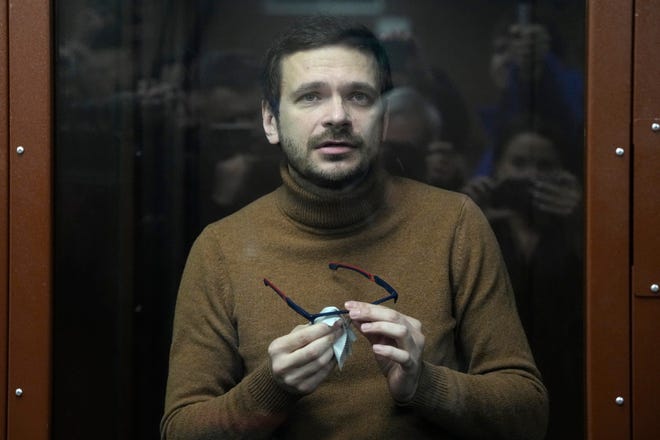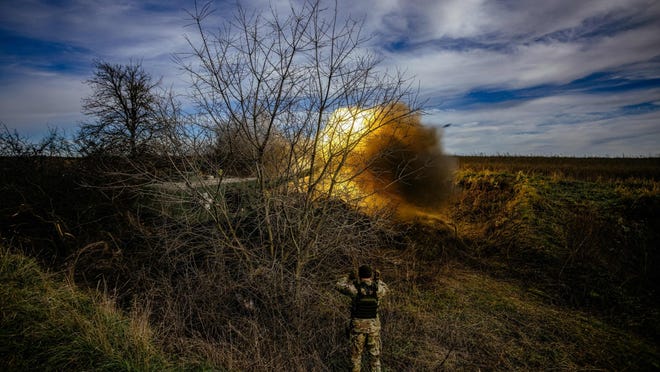Russian President Vladimir Putin drove a Mercedes across the Crimean bridge Monday, two months after it was severely damaged in a truck bombing Russian officials blamed on a Ukrainian terrorist attack.
Putin drove with Deputy Prime Minister Marat Khusnullin, who oversaw the bridge reconstruction, and spoke with some of the 500 workers at the site. Repairs on the railroad portion of the bridge are expected to be completed in 6-7 months, authorities said.
Ukraine hinted at responsibility for the attack but never fully acknowledged involvement. Russian authorities blamed Ukraine’s intelligence service and responded with several waves of missile and drone strikes that have battered Ukraine’s energy facilities and other key infrastructure.
The bridge links Russia’s mainland with the Crimean Peninsula, which Moscow annexed from Ukraine in 2014. Ukraine officials have vowed to take back Crimea.
ONLY 25% OF RUSSIANS SUPPORT WAR:Ukraine wants price cap on Russian oil cut in half
Other developments:
►The European Union’s ninth package of sanctions on Russia since it launched the war would target the country’s drone sector, which has played a major role in attacks that have ravaged Ukraine’s energy infrastructure, Bloomberg reported. The sanctions may be approved next week.
►Ukraine has reclaimed 54% of the territory taken by Russia since the beginning of the war, but the occupying forces still control 18% of Ukrainian land, including Crimea and a part of the Donbas region that has been contested since 2014, the British Defense Ministry said.
►A 25,000-ton shipment of grain, part of Ukraine’s initiative, has arrived in Djibouti for delivery to neighboring Ethiopia. The shipment comes amid the region’s worst drought in decades. Authorities say a second ship with 30,000 tons of wheat will head to Ethiopia next week, and a third is being loaded with 25,000 tons for Somalia.
►The Financial Times named Ukraine President Volodymyr Zelenskyy its person of the year for 2022. “I am more responsible than brave,” he told FT.

Explosions rock Russian bases
Explosions rocked two air bases in western Russia on Monday, including a base that houses nuclear-capable bombers involved in launching strikes against Ukraine, in what could signify an escalation of the war.
The Defense Ministry in Moscow blamed the blasts on the Ukrainians, saying it shot down two of their drones at the attacking sites, both more than 300 miles from the border shared by the countries. The Ukraine military said its forces were not involved.
The Russian state RIA Novosti news agency said three servicemen were killed, six were injured and a plane was damaged when a fuel truck exploded at an air base in Ryazan, in western Russia. The base houses long-range flight tankers that serve to refuel bombers in the air.
Authorities in the Saratov region said an explosion struck the area of the Engels air base, which houses Tu-95 and Tu-160 strategic bombers that have been involved in launching strikes on Ukraine. Those bombers are capable of carrying nuclear weapons. The Ukraine military said it had reports that two Russian servicemen were injured and two planes damaged.
“No matter how much the enemy wants (to blame Ukraine forces), we haven’t started anything yet,” said Yuriy Ignat, the spokesman of the Ukraine Air Force Command. “They have to scratch their heads, think, how and who did it, how did it happen?”
Odesa’s 1 million people without water after Russian missile strike
Hours after the explosions at the Russian air bases, cities across Ukraine faced another massive bombardment of Russian missiles Monday. The assault prompted widespread power outages and left Odesa, a Black Sea city of almost 1 million people, without running water. Air raid alerts sounded across the country, and authorities urged people to take shelter.
Ukraine’s air force said it shot down more than 60 of about 70 missiles, but national electricity supplier Ukrenergo said emergency blackouts began almost everywhere and that efforts to restore power began immediately.
In Odesa, the local water supply company said a missile strike cut power to pumping stations, shutting down the entire system. In the Kyiv province, about 40% of residents were left without power, the Kyiv Independent reported.
“Russians are terrorists who have nothing to do with civilization and human values!” Kyrylo Tymoshenko, the deputy head of the Ukrainian president’s office, wrote on Telegram.
Moldovan Prime Minister Natalia Gavrilita said the Russian airstrikes could also cause power outages in her country.
Price cap on Russian oil goes into effect as Moscow threatens to cut supplies
Global oil prices rose Monday as a West-imposed $60-per-barrel limit on Russian oil took effect. Russia said it would cut production before accepting the cap.
National Security Council spokesman John Kirby said the U.S., which is not nearly as dependent on Russian oil as Europe, would work with its EU partners to maintain stability in the market if Moscow reduces supplies.
“Not surprised by that reaction by Russia,” Kirby said. “We again believe that this price cap could make a difference in limiting Mr. Putin’s ability to profit exorbitantly off of the oil market and then turn that revenue around to kill more Ukrainians. It was never designed to take Russian oil off the market.”
India is among countries saying it will continue paying for Russian oil – though at a discount from the international benchmark Brent crude price of $87.30 per barrel.
EU, international court clash over how to prosecute Putin
The chief prosecutor of the International Criminal Court rejected a European Union proposal to create a U.N.-backed special tribunal to prosecute crimes in Ukraine. Karim Khan said the ICC is capable of dealing with war crimes committed in Ukraine, including prosecution of high-ranking political figures. EU Commission President Ursula von der Leyen announced her plan last week amid concerns Russian President Vladimir Putin could avoid prosecution for the crime of aggression under ICC rules. Khan said his office could prosecute Putin for war crimes or genocide if found appropriate.
Liz Evenson, international justice director at Human Rights Watch, expressed support for the ICC investigation.
“The serious international crimes being committed in Ukraine and elsewhere demonstrate once again the importance of the ICC’s promise of accountability and the court’s crucial role,” Evenson said.
Germany will upgrade military to counter Russian threat
The German government will soon unveil a new national security strategy aimed at becoming one of the main providers of security in Europe in the face of Russian aggression, German Chancellor Olaf Scholz said in an article for the Foreign Affairs magazine. He warned that current threats include assaults on allied territory, cyberwarfare and even the “remote chance” of a nuclear attack.
The plan calls for strengthening the European defense industry, beefing up the military presence on NATO’s eastern flank and training and equipping Ukraine’s armed forces, Scholz said. He confirmed his government’s plans to buy U.S. F-35 fighter jets.
“For the last three decades, decisions regarding Germany’s security and the equipment of the country’s armed forces were taken against the backdrop of a Europe at peace,” Scholz wrote. “Now, the guiding question will be which threats we and our allies must confront in Europe, most immediately from Russia.”
Contributing: Francesca Chambers, USA TODAY; The Associated Press





